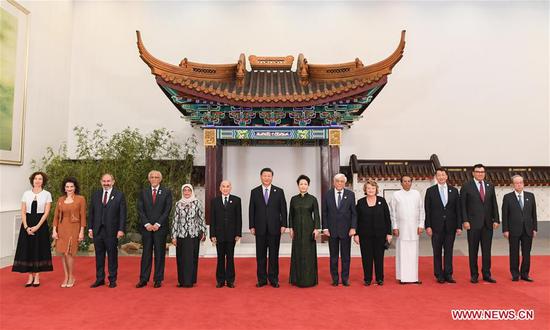Facebook is bracing itself against arguments from its co-founder and a number of U.S. politicians who are calling for a breakup of the Silicon Valley social media giant.
"I don't think dismantling companies altogether is the way to deal with some of the complex issues" like data use, privacy, the attempt by folks to interfere in our elections, which are "heavy responsibilities Facebook bears", Nick Clegg, Facebook vice-president for global affairs and communications, said in an interview with CNN on Sunday.
Clegg was responding to an op-ed by Chris Hughes, co-founder of Facebook who left the company in 2007, on The New York Times website on Thursday. Hughes argued for a breakup of the company that also owns the influential communications platforms Instagram and WhatsApp.
"What he's [Hughes] proposing that we do isn't going to do anything to help solve those issues," said Mark Zuckerberg, Facebook CEO and co-founder, in a TV interview with France Info on Friday. Zuckerberg admitted that Facebook faces social issues around "harmful content and finding the right balance between expression and safety, for preventing election interference, on privacy".
Zuckerberg and Clegg argued that Facebook welcomes more regulations and has been working with U.S. regulators on issues such as privacy.
Hughes expressed concern about the company's market dominance, saying it and Zuckerberg had too much power.
"Mark's power is unprecedented and un-American," Hughes wrote, calling Facebook "a powerful monopoly, eclipsing all of its rivals and erasing competition from the social networking category".
Hughes' contentions have found support in Congress, and U.S. President Donald Trump also has echoed some of the arguments.
The major tech companies are "really run by a small number of people", Trump said in an interview with Breitbart.com. "They're dishonest; there's tremendous dishonesty," and "a lot of people are talking about breaking them up," he said.
In March, Democratic presidential candidate Senator Elizabeth Warren of Massachusetts put in her campaign platform a pledge to introduce legislation targeting tech companies with annual revenue of $25 billion or more with more regulation.
She called out Facebook, Google and Amazon and has repeatedly vowed to break up the three tech giants as part of "big, structural changes to the tech sector to promote more competition".
"I applaud Facebook co-founder Chris Hughes for sounding the alarm on the dangers of unchecked corporate power," Democratic presidential candidate Senator Bernie Sanders of Vermont tweeted Friday.
"We are living in an era of monopolies that dominate every aspect of our lives — including our government. It's time to take that power back," Sanders wrote.
Democratic presidential candidate Senator Kamala Harris of California called Facebook "a utility that has gone unregulated" and highlighted the issue of privacy, about which "serious regulation" should be enacted.
Senator Richard Blumenthal, a Democrat from Connecticut and longtime critic of Facebook, said in an interview with CNBC on Thursday that the Justice Department needs to begin an antitrust investigation.
"Being big is not illegal. It's the misuse of that bigness, and market dominance such as Facebook has been doing by acquiring innovative companies before they can really reach maturity and also copying new technologies so as to stifle competition and innovation," he said.
Hughes wrote that Facebook has "acquired its way to dominance". He also suggested that the Federal Trade Commission (FTC) enforce antitrust laws by undoing the Instagram and WhatsApp acquisitions and ban future acquisitions by Facebook for several years.
"The FTC must set a resounding precedent that is heard by Facebook and any other tech company that disregards the law in a rapacious quest for growth, Blumenthal and Republican Senator Josh Hawley of Missouri wrote in a May 6 letter to the FTC, in regard to a privacy settlement with the company. "The commission should pursue deterrent monetary penalties and impose forceful accountability measures on Facebook."
"If Facebook's consumers value data privacy and/or security highly, they will punish Facebook if its actions do not reflect their preferences," Iain Murray, vice-president for strategy at Washington-based think tank Competitive Enterprise Institute, told China Daily.
"In the internet age, we've seen once-dominant companies like AOL, MySpace and Blockbuster fall without any antitrust action by government," said Murray, who argued that government action and breakups would take years or even decades, while a market correction already has happened.
"Anyone worried about the challenges we face in an online world should look at getting the rules of the internet right, not dismantling successful American companies," Facebook's Clegg wrote in an op-ed published in The New York Times on Saturday.
The power of American tech companies also is felt in other countries.
The French government announced last week a plan to authorize audits and to fine large social media companies if they do not remove hateful content.
Google was fined about $4.8 billion by the European Union last year for taking advantage of its dominant position in installing the Android mobile operating system, and it is also facing investigation from India's authorities.


















































